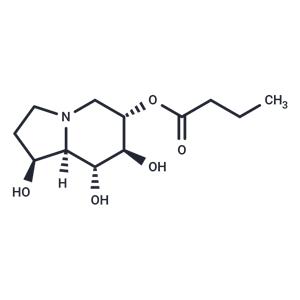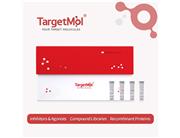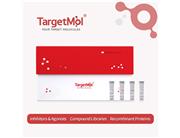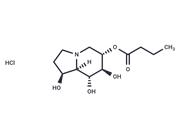| Name | Celgosivir |
| Description | Celgosivir (6 O-butanoyl castanospermine) is an inhibitor of α-glucosidase I. In vitro assay, it inhibits bovine viral diarrhoea virus (BVDV) ( IC50: 1.27 μM ). |
| In vitro | Celgosivir exhibits potent antiviral activity against HIV-1 (IC50: 2.0±2.3 μM) [1]. Celgosivir inhibits DENV2 replication (EC50: 0.2 μM). The EC50 values against DENV1, 3 and 4 are less than 0.7 μM[3]. Celgosivir is more effective (IC50=20 μM) than the parent molecule (IC50=254 μM) at causing the accumulation of glucosylated oligosaccharides in HIV-infected cells by inhibition of glycoprotein processing. Bovine viral diarrhoea virus (BVDV) is a closely related virus of hepatitis C virus (HCV). In plaque assay and cytopathic effect assay, Celgosivir inhibits BVDV, with IC50 values of 16 and 47 μM , respectively[2]. |
| In vivo | Celgosivir demonstrates robust protection in AG129 mice against lethal infection from a mouse-adapted dengue virus, effectively administered at a dosage of 50 mg/kg twice daily (BID) for a duration of 5 days. This protective efficacy is maintained even when treatment onset is delayed by 48 hours. The outcomes suggest that celgosivir's protective capability is contingent upon both the dosage and the administration schedule, with a twice daily regimen of 50, 25, or 10 mg/kg proving superior to a single daily dose of 100 mg/kg in terms of survival. Specifically, during primary infection with the mouse-adapted DENV strain S221, there is a notable increase in viremia by day 3. However, an impressive 80% of mice survive until day 10, with the virus being completely eliminated by day 8[3]. |
| Storage | Powder: -20°C for 3 years | In solvent: -80°C for 1 year | Shipping with blue ice. |
| Solubility Information | DMSO : 50 mg/mL (192.83 mM)
H2O : 1.8 mg/mL (6.9 mM)
|
| Keywords | MBI3253 | MX 3253 | MDL28574 | MDL-28574 | MX-3253 | MBI-3253 | Celgosivir |
| Inhibitors Related | N-Caffeoyl O-methyltyramine | Rebaudioside A | (E)-3-(4-Methoxyphenyl)acrylic acid | Acarbose | 3-Butylidenephthalide |
| Related Compound Libraries | Bioactive Compound Library | Kinase Inhibitor Library | Drug Repurposing Compound Library | Inhibitor Library | Clinical Compound Library | Bioactive Compounds Library Max |
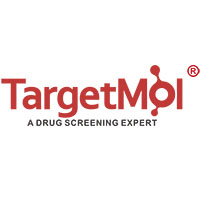
 United States
United States
